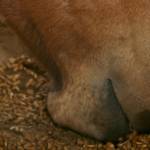Cobalt in Equine Diets

Cobalt is used by the hindgut flora to produce vitamin B12 (cyanocobalamin), but the large amount of vitamin B12 synthesized in the horse’s hindgut is not absorbed. Horses must ingest vitamin B12 from manure or manure-contaminated feed sources. Ruminants are able to absorb vitamin B12 synthesized in the rumen.
Vitamin B12 is important for energy production and formation of red blood cells. Clinical signs of cobalt deficiency are the same as for vitamin B12 deficiency and include lethargy, loss of appetite, poor growth, anemia, and weight loss.
Cobalt supplementation is important in areas where soil may be deficient, such as New England and Florida in the United States and Australia, New Zealand, Norway, and east Africa. Horses appear to be more resistant to grazing cobalt-deficient pastures than ruminants.
Vitamin B12 or cobalt deficiency has not been reported or experimentally induced in horses. The recommended cobalt requirement for horses has been set at 0.05 mg/kg (ppm) of dry matter intake, which should be met easily by feeding normal feedstuffs.








